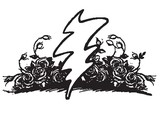CHAPTER 19
Do What You Love
In preparing to write this book, we both watched lots of footage of the Grateful Dead. One thing that stood out was how happy Jerry Garcia was on stage—he had a big smile on his face while his fingers danced up and down his guitar fret. Similarly, when we listened to interviews of him and other members of the band, they often talked about how they loved what they did. This passion helped them overcome serious odds to become a huge success.
As is often the case for people starting out in a career pursuing their passion, some of the Grateful Dead members had very humble beginnings. Jerry Garcia, for example, was really passionate about music and playing guitar, so much so that prior to starting the band, he was a guitar teacher making such meager wages that he had to live out of his car! Rather than get a “job,” he stuck with it, and his passion fueled his eventual success.
BECAUSE THE GRATEFUL DEAD LOVED WHAT THEY DID, THEY STUCK WITH IT AND (OBVIOUSLY) EVENTUALLY PROSPERED.
Since they were so passionate about what they did, the Grateful Dead were also able to persevere through some very rough times. On the first gig they booked, they were contracted for performances two nights in a row. They were so bad the first night that the owner of the joint replaced them with three elderly gentlemen in a jazz band! The band members were so embarrassed they didn’t even bother asking the owner for their one night’s pay. Rather than throw up their hands and give up, the band went back to the studio and doubled down on the practice routines. It actually took several years and a great deal of practice before they really started getting good market traction with their unique sound.
MARKETING LESSON FROM THE GRATEFUL DEAD
Do What You Love
We are taught as children that work and play are opposing forces in nature. This teaching is incorrect—it is possible that your work can be like play! In fact, if you do what you love the way the Grateful did, you’ll never “work” a day in your life.
People often end up in “jobs” they’re not passionate about because they’re living someone else’s dream—their mother-in-law’s, their competitive sister’s, their classmate’s, and so forth. It is much easier to succeed at fulfilling your own dreams for which you have passion than it is to fulfill others’ dreams—this is because you’re much more likely to do great work if you’re doing what you love. When others get tired in your industry, your passion will act like jet fuel to help you overcome barriers that they can’t. You’re much better off working in an industry in decline that you’re passionate about (i.e., even the car business) than you are working in a hot, growing industry for which you have no passion (i.e., management consulting).
Not only does doing what you love increase your odds of success, but it dramatically increases your happiness. You spend more than 50 percent of your waking adult life working, so you might as well do what you love. Doing something you don’t enjoy during more than 50 percent of your waking adult life takes a toll on your psyche that goes well beyond the boundaries of the workplace. Conversely, doing what you love pays huge dividends in your personal life.
THE GRATEFUL DEAD TEACH US TO LIVE OUR OWN DREAMS—NOT SOMEONE ELSE’S.
In the months and weeks leading up to Brian’s father’s death, Brian saw him searching to derive meaning from his life and to put his time on Earth into a broader historical context. Fortunately, his dad lived a great life full of accomplishment and love, so it wasn’t hard for him. Like Brian’s father, you want those self-conversations at the end of your life to be as fruitful as possible. You’ll never regret on your deathbed that you pursued your passion. However, you may regret spending half of your waking life in a dead-end job or living someone else’s dream.
BILL GATES TAKES CONTROL OF HIS LIFE
Some people love Bill Gates and some people hate him. Either way, you have to admire how the guy takes control of his life and follows his passions. As a young boy, Gates was geeked out about computers. He and his friend Paul Allen (who was to be cofounder of Microsoft) spent countless hours in the middle of the night at the University of Washington using the university’s mainframe computers—which must have disappointed his father, a prominent Seattle lawyer who hoped his son would follow him into the law.
Gates brought his passion with him to Harvard, where he continued to tinker with computers along with Allen. He started doing some consulting work on the side and eventually dropped out of Harvard to found Microsoft and pursue his passion full time. The rest of the story is well-worn history, as Gates eventually became the richest man in the world by doing what he loved.
After over 30 years at Microsoft and while still a relatively young man, Gates decided to retire and pursue a new passion. He and his wife, Melinda, started the Bill & Melinda Gates Foundation, which is dedicated to bringing innovations in health and learning to developing countries. By following this second passion, he has helped countless children in developing countries improve their lives.
ROCK ON
Carpe diem!
Like the Grateful Dead and Bill Gates have done before you, follow your passion and you’ll be rewarded in spades.
ACTION: If you hate your “job,” start work to change it today. Stop complaining and start doing something. For example, if you’re reading this book, you’re probably a marketing geek, business executive, or entrepreneur. Like us, you have a different vision of how marketing should be done by your company, and you have ideas on how to transform your industry. Put together a presentation on how you want to take your “job” in a new direction that will help transform the way your company markets itself. If you need more help on doing this, read our other books, The New Rules of Marketing & PR and Inbound Marketing.
If turning your job into something you’re passionate about doesn’t work in two months, then look for a new “passion.” (Change the word “job” for “passion”—it helps!) While searching for your new “passion,” turn the process on its head. Don’t go through the job boards looking for another job. Target companies and industries you’re excited about and sell them on creating a new position for you around your “passion.” Write letters to CEOs and attach your PowerPoint slide deck or brilliant blog article about how you would transform their business if the company hired you—any CEO worth her salt would take their business if the company hired you—any CEO worth her salt would take that meeting.
If you have an idea for a new company burning a hole in the back of your head, start working on it during nights and weekends—this is how many businesses start. As you get some traction, go for it. It’s less risky than you think.
Here we are, two Grateful Dead fans, and we’re actually writing a book about the band. Is this work? Well, yeah. But it is also our passion. We’re living our dream.
As Walt Disney said, “All our dreams can come true, if we have the courage to pursue them.”





